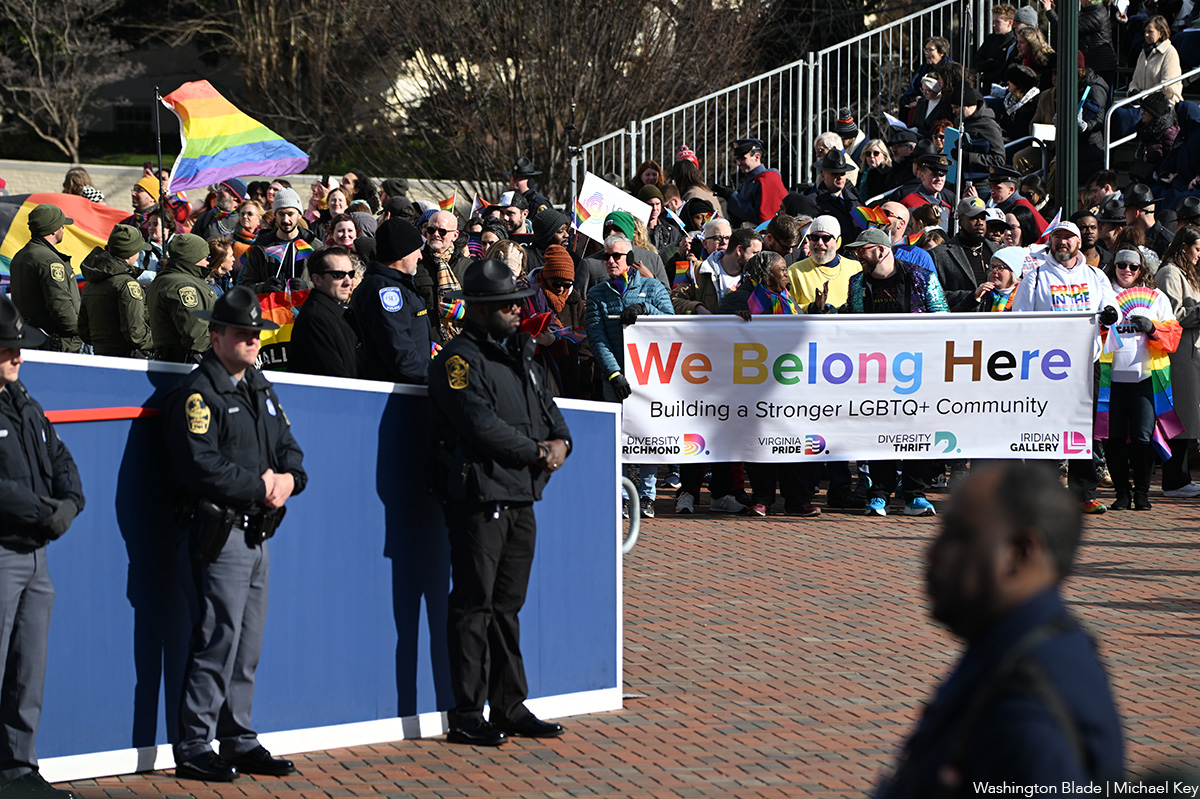Local
Beyer falls short in bid for legislature
7 gay, lesbian candidates advance in Md. races

CHEVY CHASE, Md. — The scene at Dana Beyer’s Chevy Chase, Md., home is somber. With all but seven of the 35 precincts having reported their votes, it’s clear the transgender eye surgeon-turned-political hopeful has not garnered enough votes to secure one of the three state General Assembly seats for her home turf of District 18.
Beyer was pragmatic during a brief concession speech in her living room to a houseful of canvass workers, family, friends and supporters.
“I think you all did a great job,” Beyer said. “This doesn’t reflect on you and it doesn’t reflect on me. The people we ID’ed just didn’t vote. It was the difference between the IDs and the votes. They said they were voting for us and they just didn’t. So that’s it. We just have to live with that. And as they say, people get the elected officials they deserve.”
Beyer was running against incumbents Al Carr, Ana Sol Gutierrez and Jeff Waldstreicher in this race, the Democratic primary. According to unofficial numbers, Beyer trailed all three incumbents but was ahead of the other two challengers. With all precincts accounted for, Gutierrez led with 7,397 votes, Waldstreicher was in second with 6,946 and Carr in third with 6,349 (24.17, 22.69 and 20.74 percent of the vote respectively). Beyer had 5,064 votes or 16.55 percent. Vanessa Atterbeary had 3,982 (13.01 percent) while Michael Heney trailed with just 868 votes (2.84 percent).
After her speech, Beyer admitted the loss was a tough blow.
“It’s very disappointing,” she said. “I don’t know why it happened. As I’ve said before, I knocked on over 10,000 doors, my team knocked on 18,000 doors. We made 10,000 phone calls. Over 5,300 committed to vote for me but it hasn’t happened. Why it hasn’t happened, I don’t know.”
The winners are expected to coast to an easy victory in the November general election as the district, which includes Chevy Chase, Kensington and Wheaton, is overwhelmingly Democratic.
Beyer ran on a platform of health care reform, fair taxes for the middle class and civil rights. Hot-button issues in her district include Metro’s controversial Purple Line, Pepco response to storm-induced power outages and speed cameras.
What were the topics on people’s minds during her door-to-door visits?
“It depended when it was,” Beyer said. “When we started early on, it was the budget crisis. That was the No. 1 issue. So we talked about taxes and spending. I would have preferred to speak about health care because that’s my personal interest as a physician, but that was not the hot topic. We talked about transportation, mass transit, the Purple Line, and such.”
Had she won, Beyer would have been in a solid position to make history as the first transgender person to be elected to a state legislature. Beyer also ran unsuccessfully in 2006.
She says she doesn’t think being trans was a factor this time.
“The media didn’t bring it up other than the gay media,” she said. “It was never raised in my interviews with the Post or the Gazette. With all the other media, people didn’t seem to think it was relevant. And no voter has ever, back in 2006 or this year, ever brought up the issue. And one could say, ‘Oh well they’re just being very polite,’ but it’s hard to believe that the 15,000 doors I knocked on were all just very polite people. Or that they were truly homophobic but they were just being nice to me. I don’t believe that. I think they really didn’t care.”
Elsewhere in Maryland, seven openly gay and lesbian candidates won their races. Incumbent Dels. Heather Mizeur (D-Dist. 20), Maggie McIntosh (D-Dist. 43) and Anne Kaiser (D-Dist. 14) advanced to the general election, along with newcomers Mary Washington (D-Dist. 43), Luke Clippinger (D-Dist. 46) and Bonnie Cullison (D-Dist. 19). Gay Sen. Rich Madaleno (D-Dist. 18) also won his race. With those victories, Maryland is poised to join just a handful of states served by seven openly gay and lesbian state legislators, according to a statement from the Gay & Lesbian Victory Fund.
During informal conversations at Beyer’s house while waiting for poll numbers to come in, canvassers said Beyer’s trans status was a rare, though occasional, issue when they went door to door.
“One [person] said he wasn’t voting for her because of her lifestyle choices,” said one canvasser who wasn’t authorized to speak to the press. “But I don’t think most people even knew. I had one older person say, ‘Well you know she used to be a he,’ but I really think people like that, people of that generation, are becoming extinct. People like us, under 30, we just don’t care.”
With some liberal voters, it appeared to be an advantage.
“It did come up once, I can’t remember how,” another person on Beyer’s campaign said. “They were like, ‘Holy shit, that’s progressive. I’m gonna put her picture on my refrigerator.’”
Beyer said she has no immediate plans other than sleeping in and then going on a vacation, her first, she says, in “many, many years.”
“I’m proud of the job I did, so we’ll see,” she said. “I’ve reinvented myself enough times that when I went into this, of course I didn’t know what would happen, but I intended to win. I worked very hard to win but at the end of the day, I knew it wasn’t about the end result. I’d given it my best and I’m proud of that and I’ll move on.”
Virginia
VIDEO: LGBTQ groups march in Va. inaugural parade
Abigail Spanberger took office on Saturday

The inaugural ceremonies for Virginia Gov. Abigail Spanberger were held in Richmond, Va. on Saturday. Among the groups marching in the parade were Diversity Richmond and the Virginia Pride project of Diversity Richmond.
View on Threads

Virginia
Va. Senate approves referendum to repeal marriage amendment
Outgoing state Sen. Adam Ebbin introduced SJ3

The Virginia Senate on Friday by a 26-13 vote margin approved a resolution that seeks to repeal a state constitutional amendment that defines marriage as between a man and a woman.
Outgoing state Sen. Adam Ebbin (D-Alexandria) introduced SJ3. The Senate Privileges and Elections Committee on Wednesday approved it by a 10-4 vote margin.
Same-sex couples have been able to legally marry in Virginia since 2014. Outgoing Republican Gov. Glenn Youngkin in 2024 signed a bill that codified marriage equality in state law.
A resolution that seeks to repeal the Marshall-Newman Amendment passed in the General Assembly in 2021. The resolution passed again in 2025.
Two successive legislatures must approve the resolution before it can go to the ballot. Democrats in the Virginia House of Delegates have said the resolution’s passage is among their 2026 legislative priorities.
“It’s time for Virginia’s Constitution to reflect the law of the land and the values of today,” said Ebbin after Friday’s vote. “This amendment, if approved by voters, would affirm the dignity of all committed couples and protects marriage equality for future generations.”
Maryland
Layoffs and confusion at Pride Center of Maryland after federal grants cut, reinstated
Trump administration move panicked addiction and mental health programs

By ALISSA ZHU | After learning it had abruptly lost $2 million in federal funding, the Pride Center of Maryland moved to lay off a dozen employees, or about a third of its workforce, the Baltimore nonprofit’s leader said Thursday.
The group is one of thousands nationwide that reportedly received letters late Tuesday from the Trump administration. Their mental health and addiction grants had been terminated, effective immediately, the letters said.
By Wednesday night, federal officials moved to reverse the funding cuts by the Substance Abuse and Mental Health Services Administration, estimated to total $2 billion, according to national media reports. But the Pride Center of Maryland’s CEO Cleo Manago said as of Thursday morning he had not heard anything from the federal government confirming those reports.
The rest of this article can be read on the Baltimore Banner’s website.
-

 U.S. Supreme Court4 days ago
U.S. Supreme Court4 days agoSupreme Court hears arguments in two critical cases on trans sports bans
-

 Virginia5 days ago
Virginia5 days agoWoman arrested for anti-gay assault at Alexandria supermarket
-

 Commentary5 days ago
Commentary5 days agoHonoring 50 queer, trans women with inaugural ‘Carrying Change’ awards
-

 District of Columbia4 days ago
District of Columbia4 days agoRuby Corado sentenced to 33 months in prison




















